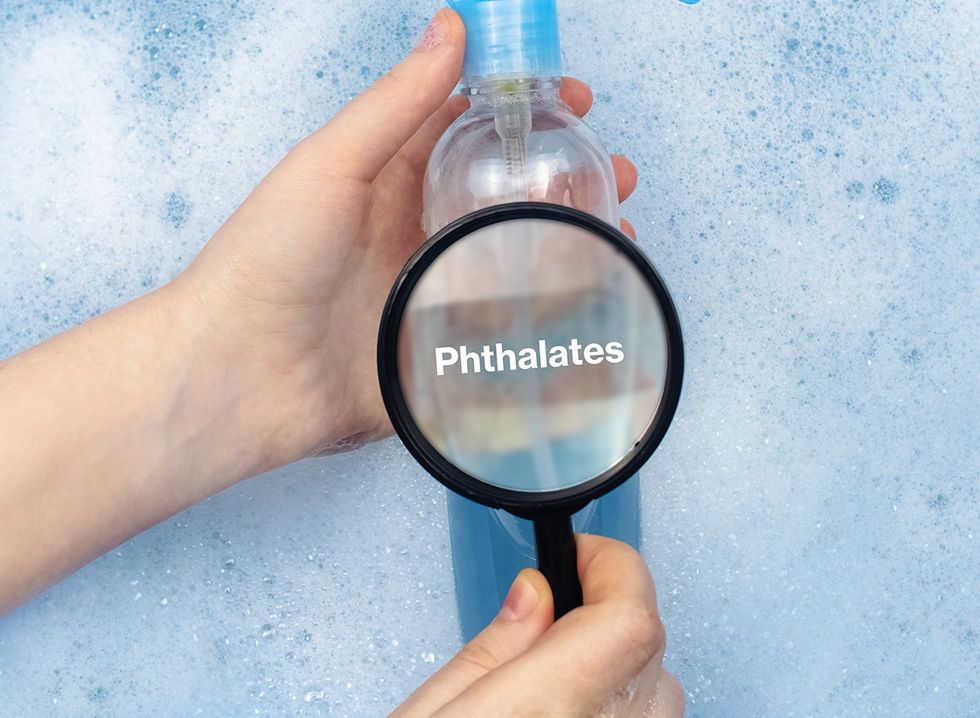Fabric softener makes clothes and towels feel extra soft and fluffy, but could it be doing more harm than good? “Overuse of fabric softeners over time starts to build a film and deposits [that] start to slow down drain time,” James Copeland, director of technical services for Prism Specialties, tells TODAY. “It can actually start to fill the drain lines and then you get other dirt, debris, grime and things from the clothes that we pick up from the environment [that] start to cling even more. So you start to get these inefficiencies and these inefficiencies affect the operation of the equipment [and] shorten the life cycle of the equipment.” So what should you use instead? Here’s what the experts say.
RELATED: 21 Laundry Mistakes You’re Making.
Toxic Ingredients
Shutterstock
That sweet scent on laundry comes at a cost, says the Environmental Working Group (EWG). “There are nearly 4,000 fragrance ingredients in common household products, and scarcely any way to know what they are. Your fabric softener may contain phthalates, which disperse scent; synthetic musks such as galaxolide, which accumulate in the body; and much more. Fragrance mixes can cause allergies, skin irritations such as dermatitis, difficulty breathing and potential reproductive harm. Research shows that scents may also cause health problems when vented outdoors, especially for asthmatics and those sensitive to chemicals.”
Eczema and Allergies
Shutterstock
Fabric softeners can cause issues for people who react to chemicals against their skin. “Fabric softeners can lead to flare-ups for those who suffer from sensitive skin and eczema due to chemicals and heavy fragrances, leading to allergies and irritation of the skin,” board-certified dermatologist Elizabeth Mullans, MD, tells Tom’s Guide. “So, while fabric softeners may upgrade one’s laundry routine, I recommend that sensitive skin sufferers avoid using them.’
Mold and Buildup

Fabric softener can build up on your clothes and towels, making them less absorbent over time. “Too much fabric softener can lead to a build up in the washer machine and an overgrowth can actually lead to the growth of mold,” Dr Mullans says. “You want to avoid a build up of fabric softener as that can stick to clothes and lead to further allergic reactions and irritation if you suffer from sensitive skin.”
Environmental Issues

Many fabric softeners contain compounds which are toxic to the environment and aquatic life. “Quaternary ammonium compounds, or quats, make clothes feel soft and wearable right out of the wash, but some are known to trigger asthma and may be toxic to the reproductive system,” says the EWG. “Check labels and product websites for these ingredients, and avoid them: distearyldimonium chloride and others ending in ‘monium chloride’ as well as vague terms like ‘biodegradable fabric softening agent’ and ‘cationic surfactant.’”
RELATED: Never Use Dryer Sheets With These Items.
Baking Soda and Vinegar
Shutterstock
A mixture of two cups of warm water, a half cup of baking soda, and half a cup of white vinegar is an effective, non-toxic fabric softener, Rechelle Balanzat, founder of Juliette, tells TODAY. You need a quarter of the mixture per load. “If you want it to smell good, you can add a few drops of essential oils,” she suggests, adding that it’s best to put it in the fabric softener compartment. “You want it to be released during the rinse cycle. If you’re going to use it the wrong way, your clothes will come out smelling like vinegar.”
Wool Dryer Balls
Shutterstock
Wool dryer balls are another safe alternative to fabric softeners. “Try 100 percent wool dryer balls,” says the EWG. “Makers of these solid balls of felted wool, or felted wool wrapped around a fiber core, say that wool or its natural lanolin soften laundry and reduce static. Generally safe for sensitive skin and babies, the balls also lift and separate clothes in the dryer, shortening drying time and saving energy.”
Washing Machine Damage

Fabric softener could be slowly causing damage to your washing machine. “In addition to safety issues, fabric softener has also been known to cause mechanical issues like clogging your washing machine over time,” says Zelouf Fabrics. “If you have a front-loading washing machine with a detergent drawer, fabric softeners can contribute to clogging or buildup in the drawer. It’s important to clean the detergent dispenser regularly to prevent any blockages.”




